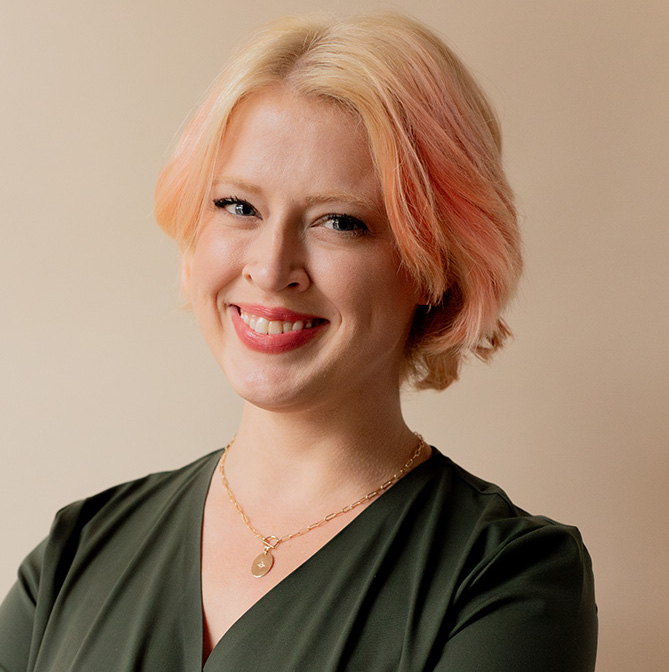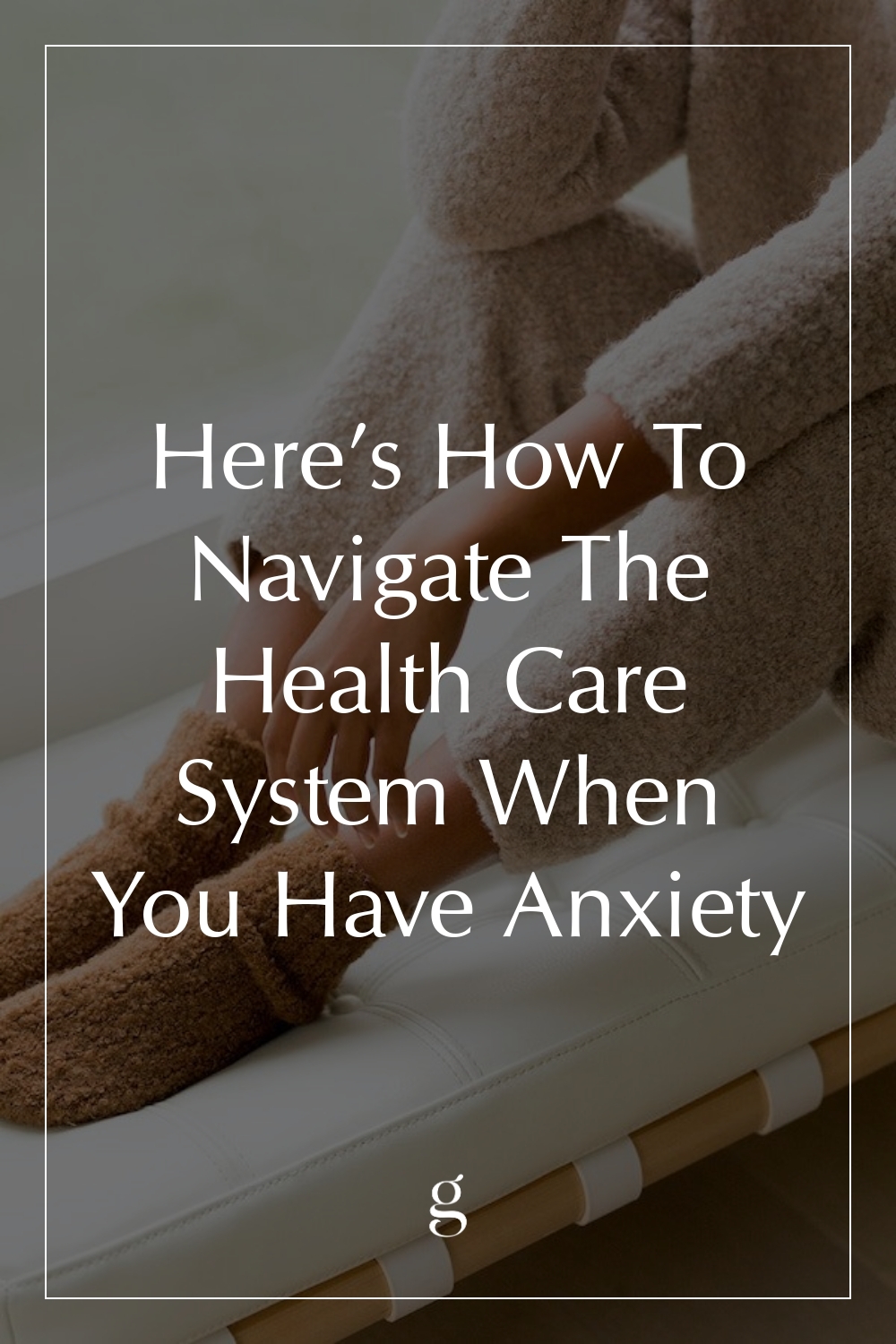
Here’s How To Navigate The Health Care System When You Have Anxiety
“Just don’t eat cheese or spicy food.”
The doctor said. She looked at me coldly, snapping off her rubber gloves after an uncomfortable (and invasive) test came up inconclusive.
I’d been having stomach pains that would double me over unexpectedly, waking me at night, throwing me into a panic. It wasn’t until after a couple of rigorous weeks of telling myself it was all in my head that a pang knocked the wind out of me. Even then, I opted for an appointment over urgent care. I didn’t consider my pain “urgent.” Perhaps, even, I thought it a punishment for what I viewed as a personal failing.
My fears and mental gymnastics culminated into a single five-minute consultation with a doctor who did not seem to care. And then I received a bill for $360 a few weeks later—money I didn’t have—for a test that gave me no information, no assistance, and not even a courteous ounce of empathy. I charged it to my credit card and tried my best to eat less cheese.
“To advocate for oneself in a space where we may have very little control requires bravery. And when you’re managing anxiety, that bravery can feel out of reach.”
That incident stoked my anxiety around health care like kindling in a wildfire. It had already required a massive amount of courage to make the appointment, to drive to a new place alone, to face something scary by myself. And to get nothing but vague diet advice felt like I’d been abandoned by a system meant to protect me. It was an abandonment. What motivation, then, would I have to return, outside of the most dire circumstances?
After that appointment, I didn’t go to any doctor for years, even though I carried insurance. To advocate for yourself in a space where we may have very little control requires bravery. And when you’re managing anxiety, that bravery can feel out of reach.
My friend’s general practitioner once told her, it’s “as if the system is designed to work against people with anxiety.” This was after she’d recommended my friend make calls to potential therapists, because there were no options for online scheduling. What often gets overlooked is that anxiety can physically prevent people from procuring help for their anxiety, among other health concerns.
There’s also the real and persistent fear that doctors will judge a person before trying to help them. Racism, sexism, and fatphobia are woven into the very founding of medical institutions and can prevent people from getting essential treatment. The onus shouldn’t be on the patients to fix this, and yet it feels like it is.
“It doesn’t change the truth: We need and deserve medical support.”
But our health—mental, physical, and otherwise—is always worth advocating for. I know it’s easy to put off phone calls, delay appointments, and minimize our suffering instead of facing treatment. We can continue to believe the stories we’ve told ourselves—that there are no solutions for me, that I can’t afford to find out there’s something wrong, or that by accepting medical or pharmaceutical help, I have failed. But these stories do more harm than good. And it doesn’t change the truth: We need and deserve medical support.
Finding a doctor
Whether you’ve just moved, changed insurance, or are searching for a new physician, an interruption in health care feels ungrounding. When looking for a doctor, remember that the proper fit goes beyond discovering whether or not they’re “in-network.”
Dr. Jessica Edwards, a board-certified Family Medicine Physician and CEO of Zara Medical, encourages patients to research both the physician and the practice before making an appointment.
“Research both the physician and the practice before making an appointment… every clinic structure is not a good fit for every type of patient.”
“I recommend particularly paying attention to the clinic structure, how many providers there are, patient reviews and the doctor’s experience with your particular health condition. Every clinic structure is not a good fit for every type of patient,” Dr. Edwards says.
Dr. Edwards also suggests concierge medicine or direct primary care if accessible communication (even after hours) is important to you. Alternatively, large, multi-specialty providers offer quick access, though you may have to compromise on physician continuity. When setting up an appointment with an in-network physician, it’s also a good idea to verify that your insurance actually covers the practice to avoid any billing surprises.
When it comes to therapy, asking questions about a therapist’s values is a recommended starting point, according to Melody Li, LMFT and Founder of Inclusive Therapists and mental health justice activist.
Li notes that this is especially “important for communities that have faced systemic oppression.” Before making that first call, you can use a therapist’s website to collect information. “If the therapist’s website or profile is not transparent about their values, it likely means advocacy is not top of mind for them,” Li says.
Making the phone call
Making the phone call can be the most difficult part. The story I find myself repeating most often is: “What if they don’t believe me?” Especially if you’re seeking psychiatric medicine or medicine for pain management, it can feel like you’re asking for something more than what the doctor is willing to give.
“Plan self-care for afterwards, so you can look forward to something soothing after a call that may stress you out.”
Start by adding the necessary phone call to your schedule for accountability. Plan self-care for afterwards, so you can look forward to something soothing after a call that may stress you out (think of it as a big hug after a hard day).
It’s okay to set up a script for yourself, too. (I even practice saying, “Hi, I’m calling to schedule an appointment.”) Write out your questions, note any upcoming schedule conflicts, and keep your pen and paper handy to jot down notes. When searching for a therapist who will validate your individual experience and take you seriously, Li suggests asking the following questions. (These questions can also be helpful when searching for a general practitioner). Pay close attention to what the practitioner says, and also how they say it.
“In what ways do you uphold social justice/ liberation through your practice?”
“What is your experience in working with people like me?”
“What are your views on privilege, power, and oppression?”
“What personal work do you do to heal and grow in areas such as race/gender/sexuality?”
Before the call, practice calming breaths. I generally get red-hot and start shaking the moment the phone rings. I have found this a good time to breathe and mentally recite an encouraging reminder like, I am okay, I am safe. This is to counteract the alternative narrative happening—that I am not worthy of care, that I cannot afford care, and that my care is not important.
Smiling and taking a phone call in front of my reflection can also make me feel assured that I’m entering a friendly interaction. In some instances, I’ve enlisted my husband to sit beside me or make the call directly. It’s okay to ask for help.
“A disruption in medicine can be a disruption of self.”
If you’re calling because you’ll run out of a prescription before your next appointment, you can request a “bridge prescription” from your doctor (your pharmacist may be able to help, too). A bridge prescription enables you to get important “one-time” refills for short intervals if you can’t see your doctor right away or if you’re in a transitional state. This might not always work, out of concern for prescription misuse, but ask anyways—a disruption in medicine can be a disruption of self.
Estimating costs
I once had a dentist begin gathering tools to start an elective procedure before telling me the cost. Only after I explicitly requested it, they handed me an estimate—$45 per tooth. They planned to start a procedure not covered by insurance without first giving me a breakdown of the cost (which would have totaled over $1,200!). If you’re worried about the bill, you’re well within your right to ask.
“Remember—it’s your right to know what services you are paying for and why.”
If you have the luxury of needing non-urgent tests, ask your doctor to document everything and request the office staff to pull together an out-of-pocket estimate.
Dr. Edwards recommends “asking for the CPT code so that you may get a cost estimation from the billing office and you can corroborate that information with your insurance company.” (Read more about what a CPT code is here—essentially, it’s a numeric code for the exact procedure or test you need).
If you need additional clarification, call your insurance services department to get an accurate estimate. See the above tips for phone calls, and remember—it’s your right to know what services you are paying for and why.
Insurance is, at least on the surface, set up to “help” you (for-profit health care in the U.S. is rife with inequity). But if you have it, try to thoroughly review your plan—specifically, the type of plan and whether or not you have access to an Health Savings Account (HSA), which differs from a Flexible Spending Account (FSA). I’ve found HSAs particularly helpful for out-of-pocket expenses. They can even help pay for dental and optical needs. Look for a breakdown of your co-pays (often listed on your insurance card), as well, so that you can quickly tell when costs aren’t right.
“Patient advocates also provide case management and support by negotiating medical bills on your behalf.”
If the bills still come in way over what you expected, you can negotiate them. But that’s a terrifying prospect for those of us who tremble at the mere thought of a phone call. Consider enlisting a professional negotiator or a trusted friend. Alternatively, the Patient Advocate Foundation offers financial support for out-of-pocket expenses if you’re experiencing financial hardship. Patient advocates can also provide case management and support by negotiating medical bills on your behalf.
Finally, therapy can be the most difficult since it’s not often covered by health insurance in the U.S. Here are some relatively affordable options for virtual therapy (or look for local options with sliding scale fee structures). Open Path Collective and Inclusive Therapists offer affordable (and virtual) options. You can also look for therapy funds like the Loveland Foundation and the National Queer And Trans Therapists Of Color Network.
Managing uncertainty during the appointment
If you’re going to the doctor for a specific concern, you might leave with the classic “stop eating cheese” recommendation. Or you might find out that WebMD’s worst-case scenario has come true. For some people, it feels safer never to know (it can seem easier to control “not knowing” than it is to face a scary diagnosis).
But, I say this with as much love as I can muster, to myself and to you: It’s not bravery to avoid confronting uncomfortable truths. You won’t win any prizes for pretending to be okay. “In a culture that values ‘rugged individualism’, asking for help is falsely seen as ‘weak,'” Li says. “In truth, seeking help is a courageous act.”
““In a culture that values ‘rugged individualism’, asking for help is falsely seen as ‘weak.’ In truth, seeking help is a courageous act.””
But if you don’t know what you’re up against, how can you soothe the anxiety of uncertainty? This, again, is where a script is helpful. If you’ve done your research, note what you’ve found and ask your doctor for their thoughts.
Be honest with your doctor. If you’re taking drugs not listed on your current medications list, as long as it isn’t harming others, HIPAA protects your privacy (aka your doctor can’t legally report you for that weed brownie you ate in college).
However, it’s also okay to protect yourself if you feel uncomfortable. For example, if a doctor ignores your symptoms in favor of a “one size fits all” solution (such as losing weight), that’s a red flag. If they dismiss your concerns without suggesting evidence, research, or testing options, you’re free to seek another opinion—and another doctor. You deserve a provider who is invested in your overall wellness, not just the numbers on a scale.
Consider other questions that can help calm anxieties that may arise after the appointment. Here are some I like to ask:
What would you do if you or a family member got this diagnosis?
What is this test/procedure for?
When can I expect results, and how will I receive them? (i.e., will you call me, or can I get a message online?)
What are the next steps once I get results?
How can I ask follow-up questions as they arise, and do you have additional resources you trust that I can refer to?
Can we schedule our follow-up appointment today?
Finally, you can bring a friend to your appointment, which can be especially helpful if you’re receiving a lot of medical information or if you need emotional support. A friend can even bring along a list of your questions and take notes for you. If COVID is preventing you from bringing a buddy, Dr. Edwards suggests asking your physician to include your loved one via speakerphone or video call.
Keeping records
In yet another one of my mild health care adventures, I called a former doctor to ask that my medical records be transferred to my new doctor in a new state. They would not release them unless I came in-person to sign off, and I didn’t know my rights in that situation. I ended up frustrated, flustered, and without the records I needed to understand my full medical history. I got re-tested and evaluated for the things I could remember but didn’t have information that could have shown whether I was improving or not.
This can be a common obstacle, especially if you were young when you received a diagnosis and don’t have access to your guardian’s notes or records. These days, online patient portals have become my favorite tool for scheduling, accessing test results, and sending quick notes to my doctor. I particularly like to read through notes my doctor took during my last appointment to ensure that I voiced my concerns thoroughly and that the doctor listened attentively. If something is missing, I can send a note or schedule a follow-up.
“I particularly like to read through notes my doctor took during my last appointment to ensure that I voiced my concerns thoroughly and that the doctor listened attentively.”
If a patient portal isn’t available to you, you can ask for a health summary at the end of your visit. This includes chronic and acute health conditions, your medications, your specialists, lab results, your allergies and dates of your appointments, Dr. Edwards explains. “This is a great resource for you to have not only to stay on top of your health, but this is also helpful for when you see a specialist,” she says.
Keep a document that tracks the medicines and supplements you’re on and your dosage so that you can have that information handy in case there’s important interaction information. Here are some great suggestions on how to stay organized, from apps to physical file management‚ and a reminder only to use apps that are verifiably HIPAA-Certified.
When you do receive a diagnosis, ask for clarification on why you are receiving it. Like with PCOS or IBS, some conditions can be based on a diagnosis of exclusion (essentially a process of elimination). It’s helpful to know why you’ve been given a particular label in case you want to explore other diagnoses in the future.
If you do one thing today, and if that one thing is to call your doctor or psychiatrist or insurance provider, know that you’ve moved a mountain. Sometimes the hardest thing we can do is admit that we need help—physically, mentally, financially, or emotionally. It’s a deeply vulnerable act to reach out, even for preventative care and yearly screenings.
“Your body and your mind deserve intuitive self-care and a team of professionals who want to support you.”
Your body and your mind deserve intuitive self-care and a team of professionals who want to support you. It’s easy to feel like the world is against you; sometimes, it’s even designed that way. But I promise you aren’t alone.
And if all of this fails, or you stumble across a rough period where it’s difficult to advocate for yourself, I hope you’ll hear this: You are worth fighting for.
RELATED READING
Emily Torres is the Managing Editor at The Good Trade. She’s a Los Angeles transplant who was born and raised in Indiana, where she studied Creative Writing and Business at Indiana University. You can usually find her reading or writing, caring for her rabbits, or practicing at the yoga studio. Say hi on Instagram!


